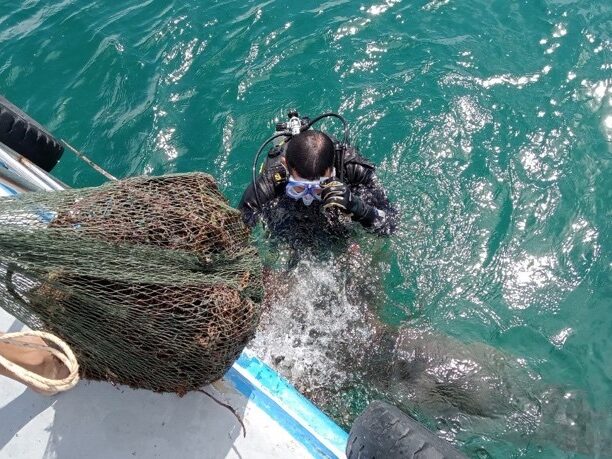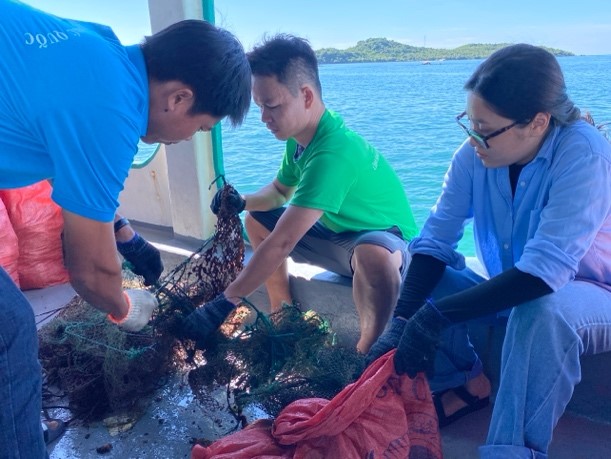Coral Reefs vs. Ghost Gear
Mr. Ly Vanh Tha, clad in a diving suit, gradually disappears into the embrace of the rolling ocean waves. He diligently cleans coral reefs for hours beneath the sea, meticulously untangling every ghost net and cutting each piece of entwined fishing line. Tha has dedicated over 13 years to this crucial work, collaborating with officers from the provincial Marine and Inland Wetlands Conservation Division (MIWCD) of Phu Quoc National Park, contributing to biodiversity conservation and reducing plastic waste on the famous island of Phu Quoc, Viet Nam.
Phu Quoc – otherwise known as Pearl Islands – is home to diverse marine habitats, boasting extensive seagrass meadows and over 470 hectares of coral reefs, with at least 260 marine species recorded. However, it also faces pressing environmental challenges, with plastic pollution posing a direct threat to its marine ecosystems. The park officers of the Phu Quoc Marine Protected Area, established since 2007, have been striving to maintain the health of coral reefs and protect the marine biodiversity of Phu Quoc, an integral part of the UNESCO-recognized Kien Giang Biosphere Reserve.
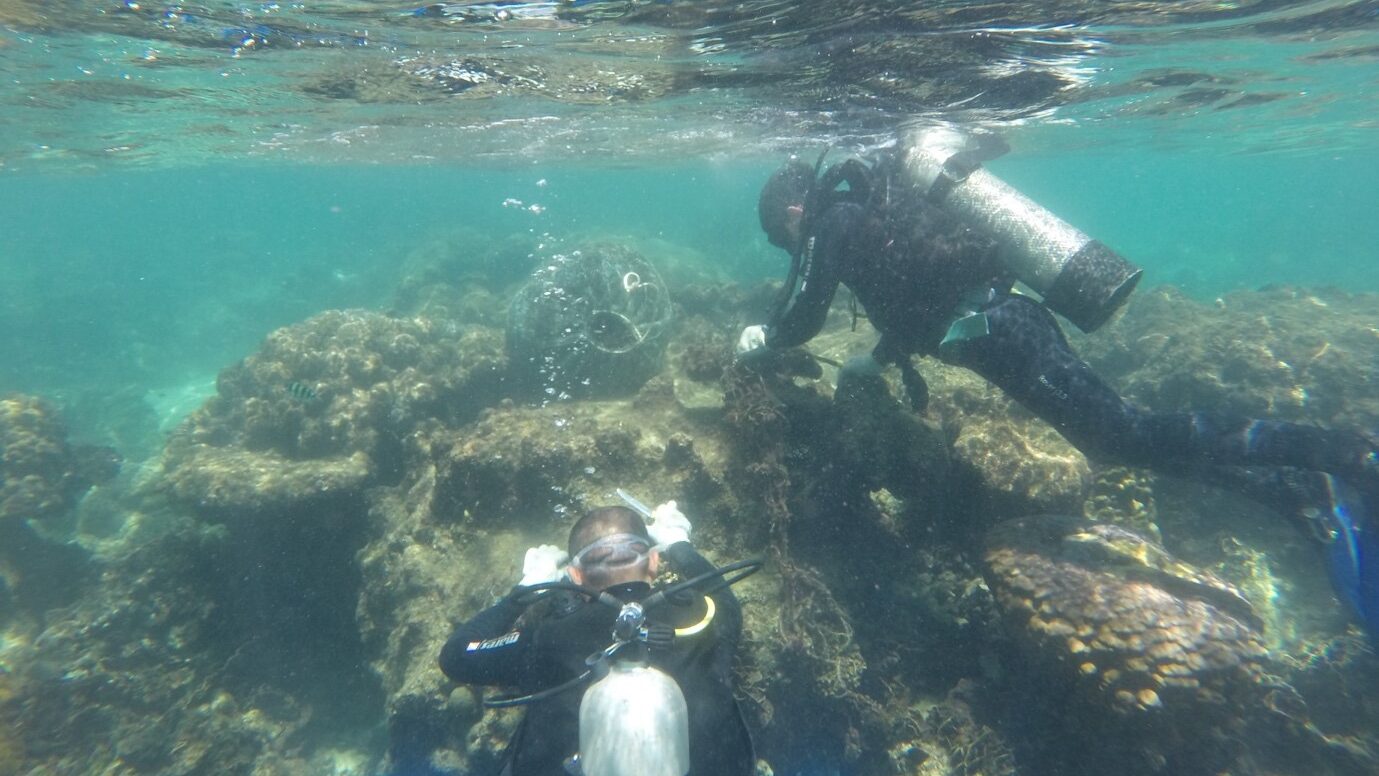
An Audit of Coastal Plastic Waste
The coastal plastic waste audit is one of the vital activities carried out by the MIWCD since 2019, a biannual effort at specific locations.
Enduring the scorching sun during the dry season and heavy rain in the wet season, MIWCD’s officers and volunteers spend hours on the beach, meticulously organising, classifying, and documenting every tiny piece of plastic to analyze the quantity and composition. This provides in-depth data and analysis on the sources and impacts of plastic waste on the environment and marine ecosystems, creating a comprehensive picture of the current state of coastal plastic pollution – an essential contribution to enhancing the effectiveness of plastic waste management in Phu Quoc.
Through this audit, which leverages beach clean-up efforts, MIWCD has collected 0.5 to 1.5 tons of plastic waste.
Ghost Gear: The most deadly form of marine plastic debris
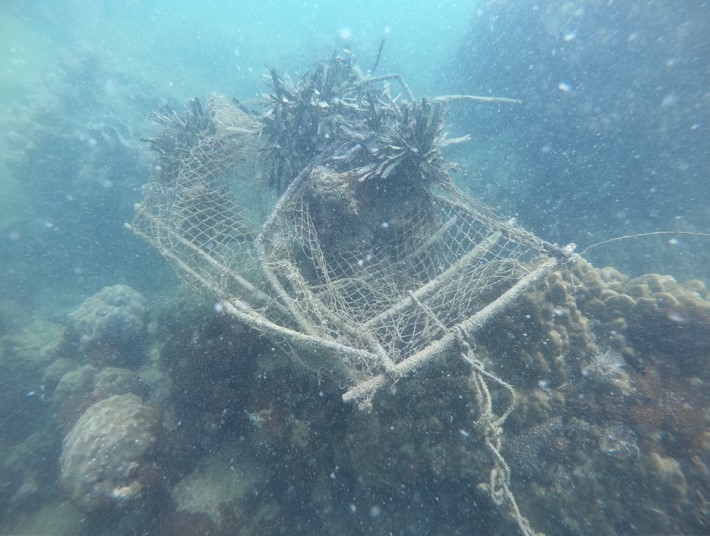
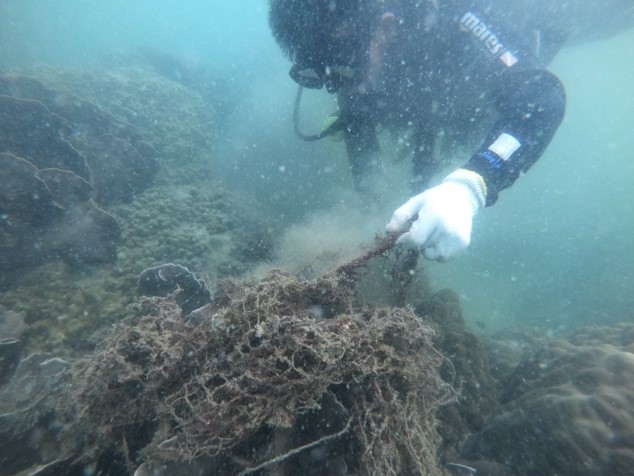
Each year, 500,000 to 1 million tons of fishing gear has the potential to find its way into the ocean, becoming a significant threat to the health of marine ecosystems, especially coral reefs. In response, MIWCD has undertaken biannual coral reef clean-up endeavours since 2020, at various marine biodiversity monitoring points where tourism and fishing activities converge.
To find and remove the ghost gear, Tha and his dedicated team descend to depths of 5-6 meters for hours. Confronting strong underwater currents and relentless pressure, the team disassembles and removes ghost nets ensnared within and among reef structures in a substantial 500 m2 expanse of the seabed. Some ghost nets stretch up to 5-10 meters in length and 3-4 meters in width.
“Diving for hours underwater is challenging; if you’re not careful, the ghost nets can get entangled on our scuba tanks while we’re underwater which could be life threatening if we get stuck ,” Tha shares.
These underwater clean-up efforts contribute to protecting and restoring the health of coral reefs. In the early years, these activities were spearheaded by the MIWCD team. Since 2021, the initiative has received active participation from four diving centres and 20 volunteers. Together, they collect over a ton of ghost nets and plastic waste during each operation.
[Read other stories about Viet Nam]
Coastal Tourism – Boon or Bane?
As a prominent island city in southern Viet Nam, Phu Quoc attracts millions of visitors each year. While its booming tourism industry brings economic benefits to the island’s businesses, this also exerts considerable pressure on marine biodiversity, adding further challenges to those already faced by MIWCD, such as increasingly extreme weather conditions and lack of adequate capacity – including human resources for highly technical activities.
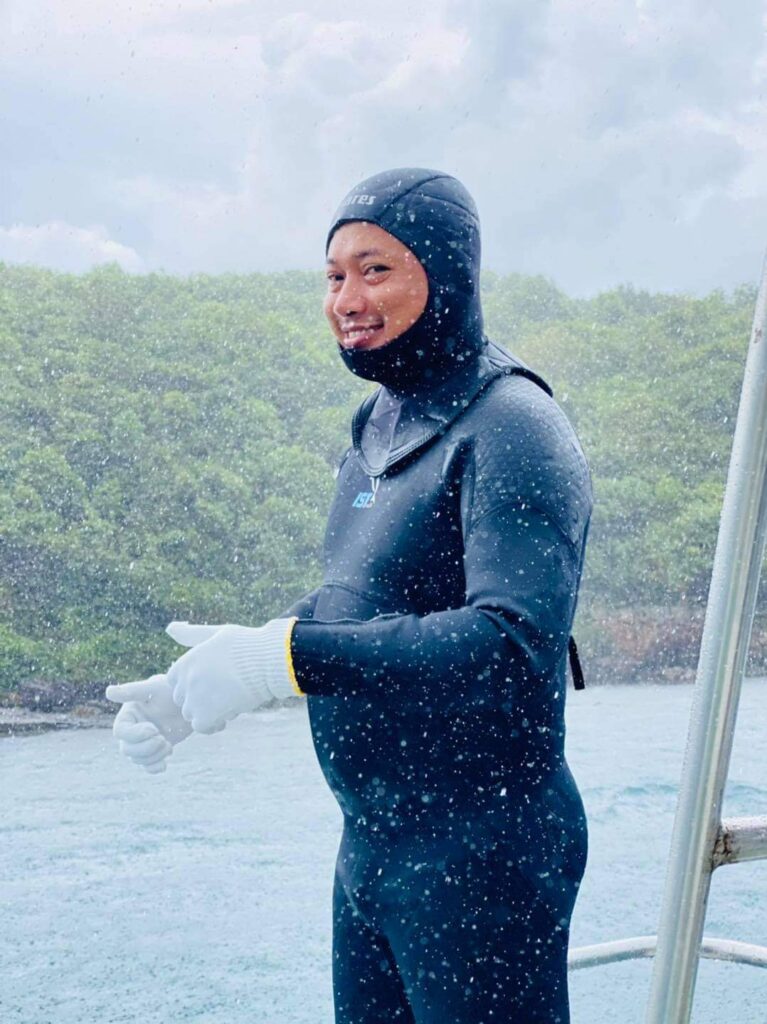
“I know it’s tough, but it has become my profession. I feel that I can contribute to the sea and the community, and that’s fulfilling enough for me. Often, when cleaning the beach, residents and tourists appreciate my diving efforts and lend their support. Although it’s not much, I’m happy knowing that my work is acknowledged by others,” Tha said as he smiles.
Tha has dedicated over a decade to his profession despite the many challenges. The love for his job and a personal sense of responsibility to the island keeps him connected to this work, contributing to the preservation of nature on Pearl Island.
Beyond waste audits and removing ghost gear, MIWCD is also expanding its outreach to local households and tour guides to raise awareness on plastic pollution and its negative impact on the Marine Protected Area (MPA), which in turn affects tourism and their livelihoods. In the coming months, MIWCD will continue with its Coastal Plastic Waste Audit and coral reef clean-up activities, enhance community awareness on not disposing plastic waste in the marine and coastal environment, and on the importance of maintaining a healthy marine environment and keeping Phu Quoc’s tourism industry thriving.
